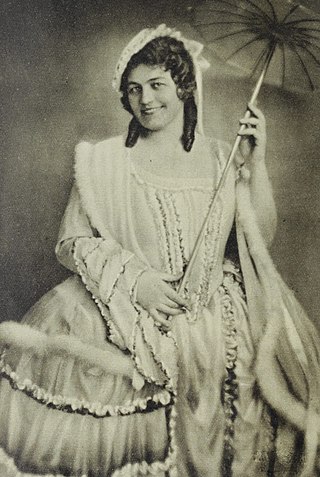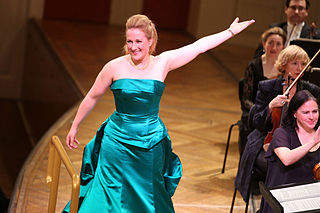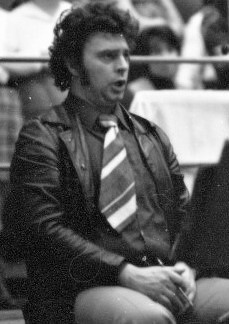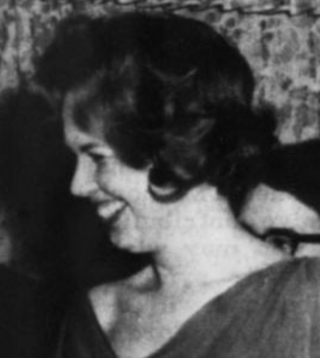Related Research Articles

Elisabeth Rethberg was a German operatic spinto soprano singer who was active from the period of the First World War through the early 1940s. After Richard Strauss assigned the role of the Empress in his Die Frau ohne Schatten to her at the Dresden Opera in 1919, she went on to perform as Verdi's Aida at the Metropolitan Opera in New York City and La Scala in Milan, among others. She returned to Dresden often, including to appear in title role of Die ägyptische Helena in the world premiere.
The German Fach system is a method of classifying singers, primarily opera singers, according to the range, weight, and color of their voices. It is used worldwide, but primarily in Europe, especially in German-speaking countries and by repertory opera houses.

Helen Jeanette Donath is an American soprano with a career spanning fifty years.

Cheryl Studer is an American dramatic soprano who has sung at many of the world's foremost opera houses. Studer has performed more than eighty roles ranging from the dramatic repertoire to roles more commonly associated with lyric sopranos and coloratura sopranos, and, in her late stage, mezzo-sopranos. She is particularly known for her interpretations of the works of Richard Strauss and Richard Wagner.

Viorica Ursuleac was a Romanian operatic dramatic soprano.
Anna Tomowa-Sintow is a Bulgarian soprano who has sung to great acclaim in all the major opera houses around the world in a repertoire that includes Mozart, Rossini, Verdi, Puccini, Heinrich Marschner,Wagner, and Strauss. She enjoyed a particularly close professional relationship with conductor Herbert von Karajan from 1973 until his death in 1989.

Eberhard Freiherr von Waechter was an Austrian lyric baritone, celebrated for his performances in the operas of Mozart, Richard Wagner and Richard Strauss. After retiring from singing, he became intendant of the Vienna Volksoper and the Vienna State Opera.

Diana Damrau is a German soprano who achieved international fame for her performances, primarily in opera, but also in concert and lieder. She has been successful in coloratura soprano roles since her early career, and gradually proceeded into heavier roles of the 19th-century Italian bel canto repertoire. Her signature roles include the Queen of the Night in The Magic Flute, Zerbinetta in Ariadne auf Naxos, Lucia in Lucia di Lammermoor, and Violetta in La traviata.

Bernd Weikl is an Austrian operatic baritone, particularly known for his performances in the stage works by Richard Wagner. He also has written books and directed operas.
Lois Jeanette McDonall is a Canadian operatic soprano, especially known for her performances in the operas of Mozart and Donizetti.
Esther Réthy was a Hungarian operatic soprano who had a major career in Europe from 1934 through 1968. She was notably a principal artist at the Vienna State Opera for over a decade and was a frequent performer at the Salzburg Festival. She performed a broad opera repertoire that encompassed French, German, Italian, Czech, and Hungarian operas. The latter part of her career was dedicated mainly to performing the German operetta literature at the Vienna Volksoper. A very beautiful woman, she was a greatly admired Angele in Richard Heuberger’s Der Opernball.
This list includes opera productions of the Opera Group and Opera Company of Boston from 1958 to 1990.

Rachel Willis-Sørensen is an American operatic soprano.

Kay Griffel is an American operatic spinto soprano.
Hertha Töpper was an Austrian contralto in opera and concert, and an academic voice teacher. A member of the Bavarian State Opera, she appeared in leading roles at major international opera houses and festivals.

Camilla Nylund is a Finnish operatic soprano. She appears internationally in lyric-dramatic roles such as Beethoven's Leonore, Verdi's Elisabetta, and Wagner's Elisabeth and Sieglinde. She is especially known for portraying leading female characters in operas by Richard Strauss,. She has appeared at international festivals and the openings of the Dresdner Frauenkirche and the Elbphilharmonie.

Margit Bokor, born Margit Wahl, was a Hungarian operatic soprano. She created the role of Zdenka in Arabella by Richard Strauss at the Semperoper in 1933, but then had to leave Germany. She was a member of the Vienna State Opera from 1934 to 1938. She moved to Paris, then emigrated to the United States in 1939, continuing her career at opera houses of the Americas.
Kwangchul Youn is a South Korean operatic bass and academic voice teacher. He made an international career based in Germany, from 1994 to 2004 at the Berlin State Opera. He has performed leading roles at international opera houses and festivals, such as Gurnemanz in Parsifal at the Bayreuth Festival, Mephisto in Faust at the Vienna State Opera, and King Marke in Tristan und Isolde at the Metropolitan Opera.
Barbara Daniels is an American operatic soprano.
Silvia Hauer is a German operatic mezzo-soprano. A member of the ensemble of the Hessisches Staatstheater Wiesbaden since 2015, she has performed leading roles such as Cherubino in Mozart's Le nozze di Figaro, Rosina in Rossini's Il Barbiere di Siviglia, Bizet's Carmen, and the title role in Der Rosenkavalier by Richard Strauss. Her concert repertoire includes Oskar Gottlieb Blarr's Jesus-Passion and Verdi's Requiem.
References
- Citations
- 1 2 3 4 Bach Cantatas Website
- ↑ Strauss, Sebastian (2020). "Harteros, Anja". Die Musik in Geschichte und Gegenwart.
- ↑ "Past Winners". Archived from the original on 7 March 2005. Retrieved 2 November 2007.
- ↑ "Une mise en scène contemporaine étreint "Cosi fan tutte" avec bonheur". Le Monde. 18 April 2001. Retrieved 6 March 2021.
- ↑ Ashley, Tim (17 August 2001). "Cosi fan tutte – Edinburgh Festival 2001". The Guardian.
- ↑ "Bayreuth in München" . Neue Zürcher Zeitung. 26 February 2002.
- ↑ Hanssen, Frederik (5 November 2002). "Die Erde ist doch bewohnbar". Der Tagesspiegel.
- ↑ "Met's 'Figaro' simply unforgettable". Desert News. AP. 5 October 2003.
- ↑ Tommasini, Anthony (3 March 2004). "MET OPERA REVIEW; A Monster From Mozart, Oozing Seductive Charm". The New York Times. Retrieved 5 December 2020.
- ↑ Kragen, Pam (5 May 2004). "There's a lot new about San Diego Opera's eighth 'La Traviata'". The Morning Call.
- ↑ Kragen, Pam (30 March 2005). "Glorious 'Simon Boccanegra' a triumph for San Diego Opera". The San Diego Union-Tribune.
- ↑ Tošić, Ljubiša (24 August 2006). "Poliertes Seelendrama: "Idomeneo"". Der Standard. Retrieved 26 January 2021.
- ↑ Apthorp, Shirley (18 October 2006). "Otello, Semperoper, Dresden". Financial Times.
- ↑ "The new opera house opened". Royal House of Norway. 15 April 2008. Retrieved 26 January 2021.
- ↑ Kassebeer, Søren (22 September 2008). "Med bål og brand". Berlingske (in Danish).
- ↑ Richard Fairman (6 May 2008). "Simon Boccanegra, Royal Opera House, London". Financial Times.
- ↑ Tillmann, Thomas (21 February 2011). "Köln: Il Trovatore". Online Musik Magazin.
- ↑ Chute, James (10 March 2011). "Soprano Anja Harteros cancels San Diego Opera appearance". Chicago Tribune.
- ↑ Hell, Tobias (3 June 2011). "Neuer "Rosenkavalier": Schonfrist für ein Münchner Opern-Heiligtum". Münchner Merkur.Clark, Andrew (25 July 2011). "Der Rosenkavalier, Bavarian State Opera, Munich". Financial Times.
- ↑ "Der schönste Schein – Anja Harteros begeistert im "Rosenkavalier" an der Staatsoper". Wiener Zeitung. 9 December 2011. Retrieved 20 July 2020.
- 1 2 Zachary Woolfe (4 July 2017). "What's Keeping One of Opera's Greatest Sopranos From Singing?". The New York Times. Retrieved 14 March 2024.
- ↑ "Die Sängerin des Jahres 2009" (in German). Ö1. 7 January 2010. Retrieved 19 December 2020.
- ↑ "Kritikerumfrage der Zeitschrift "Opernwelt" 2017". Theaterkompass.de. 29 September 2017.
- ↑ "Anja Harteros erhält ersten Kölner Opernpreis [update]". Neue Musikzeitung. ddp. 16 April 2010.
- ↑ "Kölner Opernpreis erstmals verliehen". CityNEWS Köln. 21 June 2010.
- ↑ "German stars clean up at International Opera Awards". DW. dpa. 27 April 2015.
- ↑ "Kulturpreis in der Frauenkirche: Ein Taurus aus Dresden". Dresdner Neueste Nachrichten. epd. 9 June 2018.
- ↑ "Ministerpräsident Dr. Markus Söder verleiht Bayerischen Verdienstorden". Bayern.de. 22 June 2018. Retrieved 19 December 2020.
- ↑ "Staatsoper ehrt Anja Harteros mit Meistersinger-Medaille". Die Welt. dpa. 4 November 2019.
- ↑ Tim Ashley (11 January 2008). "Strauss: An Alpine Symphony/Four Last Songs; Harteros/Staatskapelle Dresden/Luisi". The Guardian. Retrieved 14 March 2024.
- ↑ Tim Ashley (10 October 2013). "Verdi: Requiem - Harteros/Garanča/Kaufmann/Pape/La Scala Orchestra and Chorus/Barenboim (Decca)". The Guardian. Retrieved 14 March 2024.
- ↑ Andrew Clements (7 October 2015). "Verdi: Aida review – Pappano brings gorgeous colours and textures to a spectacular studio recording". The Guardian. Retrieved 14 March 2024.
- ↑ "Porträt der Sopranistin Anja Harteros". fernsehserien.de. Retrieved 8 February 2021.
- Sources
- Anja Harteros (Soprano) by Aryeh Oron. Bach Cantatas Website, December 2008.
- List of reviews and articles Archived 4 March 2016 at the Wayback Machine in Opera News including, Martin Bernheimer, 'Donna Anja' (cover story) Opera News, March 2004.
- Anne Midgette, 'The (New) Women of Figaro', The New York Times , 28 September 2003